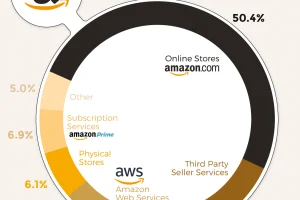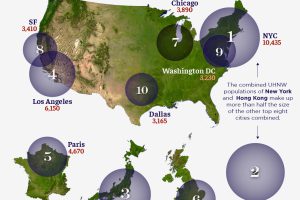The Briefing
- Legal sports betting reached over $93 billion in the U.S. in 2022.
- New York State had the most wagers, with a total of $16.3 billion.
Legal Sports Betting Totals by State
Which states are driving the legal sports betting market, and which have not yet become major players? The answer is fueled by each state’s legalization status, population, and other factors.
In this graphic from Roundhill Investments, we show a breakdown of legal sports betting by state.
A State View of Legal Sports Betting
In 2022, sports betting was live in 31 states plus Washington, D.C. Betting activity is highly concentrated, with the top five states accounting for 57% of the total reported legal wagers.
| State/District | Legal Sports Wagers in 2022 |
|---|---|
| New York | $16.3B |
| New Jersey | $10.9B |
| Illinois | $9.8B |
| Nevada | $8.7B |
| Pennsylvania | $7.3B |
| Arizona | $5.5B |
| Colorado | $5.2B |
| Virginia | $4.9B |
| Michigan | $4.8B |
| Indiana | $4.5B |
| Tennessee | $3.9B |
| Iowa | $2.3B |
| Louisiana | $2.3B |
| Connecticut | $1.5B |
| Maryland | $981M |
| New Hampshire | $892M |
| Kansas | $719M |
| West Virginia | $569M |
| Rhode Island | $533M |
| Mississippi | $532M |
| Oregon | $498M |
| Washington D.C. | $216M |
| Arkansas | $185M |
| Wyoming | $145M |
| Delaware | $82M |
| Montana | $51M |
| South Dakota | $7M |
| New Mexico | Legal, no data |
| North Carolina | Legal, no data |
| North Dakota | Legal, no data |
| Washington State | Legal, no data |
| Wisconsin | Legal, no data |
| Massachusetts | Legal, became operational in 2023 |
| Ohio | Legal, became operational in 2023 |
| Florida | Legal, not yet operational |
| Maine | Legal, not yet operational |
| Nebraska | Legal, not yet operational |
| Alabama | Not legal |
| Alaska | Not legal |
| California | Not legal |
| Georgia | Not legal |
| Hawaii | Not legal |
| Idaho | Not legal |
| Kentucky | Not legal |
| Minnesota | Not legal |
| Missouri | Not legal |
| Oklahoma | Not legal |
| South Carolina | Not legal |
| Texas | Not legal |
| Utah | Not legal |
| Vermont | Not legal |
New York State had the most legal sports betting, largely because it was the most populous state to allow online sports wagers so far. Notably, 1.2 million accounts were created in the first 10 days of legalization. New York also has multiple teams across all four major sports—football, basketball, baseball and hockey—which boosts local interest.
New Jersey took the second spot. The state challenged the federal ban against legal sports betting, winning their case in 2018. New Jersey has since rapidly established itself as a sports betting hub, thanks to its established gaming regulations, prime location near New York City and Philadelphia, and strong gaming and tech infrastructure.
Illinois had the third highest annual total, and beat its prior state record with $1 billion in wagers in October alone. One key factor was a change to the registration process in 2022, which allowed residents to sign up online rather than in-person at a casino. Not only that, the state is home to some popular teams including the Chicago Bulls, who have the third-largest social media following of any NBA team.
Smaller, and Not Yet Legal, Markets
South Dakota had the lowest legal sports betting of the states with reported totals. The state only allows in-person betting in the city of Deadwood and at tribal casinos, with the latter not reporting the total bets they receive. Online sports betting is not yet legal in the state unless the bettor is physically at a Deadwood casino.
Montana had the second smallest total bets. The state has a small population and no major league professional sports teams. Not only that, sports betting in the state is government-run rather than a competitive market. Like South Dakota, online bets can only be placed when the bettor is physically present at a retailer.
Notably, the most populous states of California, Texas, and Florida do not yet have legal and/or operational sports betting. Together, the three states represent 27% of the total U.S. population. Sports betting was initially legal in Florida but has been paused due to ongoing legal proceedings.
Expanding Geographic Reach
Legal sports betting has expanded significantly since the federal ban was lifted in 2018. However, 17 states have not yet legalized sports betting in any form, and some states could see growth from allowing online betting.
As more states proceed with legalization, the consumer base is likely to continue expanding. This creates a revenue opportunity for sportsbook operators. In fact, Goldman Sachs estimates that the total revenue opportunity could grow from $900 million in 2021 to $39 billion by 2033.
Looking for exposure to the growing sports betting industry? Explore Roundhill’s sports betting ETF, $BETZ.





